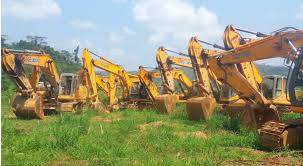Government Moves to Track Excavator Imports – What It Means for the Industry
Introduction
In a significant move to regulate the construction and mining industries, the government has decided to track excavator imports. This policy change is expected to impact businesses, importers, and contractors who rely on these heavy machines for infrastructure projects. With concerns over unregulated imports, tax evasion, and environmental impact, this decision aims to bring more transparency and accountability.
In this blog, we’ll explore why the government is implementing this change, how it affects the industry, and what stakeholders need to do to comply.
Why Is the Government Tracking Excavator Imports?
The decision to track excavator imports stems from several key reasons:
1. Curbing Illegal Imports
Illegal or undeclared imports of excavators have been a growing concern. Some companies and individuals import these machines without proper documentation, avoiding import duties and regulations. This results in revenue losses for the government and creates unfair competition for legitimate importers.
2. Preventing Tax Evasion
Some businesses underreport the number of excavators they bring into the country, allowing them to evade taxes. By tracking these imports, authorities can ensure all machines entering the market are properly documented and taxed accordingly.
3. Regulating Environmental Impact
Excavators play a crucial role in construction and mining, but older or unregulated models can contribute to excessive pollution. By monitoring imports, the government can ensure that only eco-friendly and compliant machinery enters the country.
4. Enhancing Safety Standards
Safety concerns regarding used or outdated excavators are another reason behind this move. The government wants to prevent the entry of substandard machinery that could pose risks to operators and construction sites.
How Will Excavator Import Tracking Work?
The tracking system is expected to include:
Mandatory Import Declarations: Importers will need to provide detailed documentation on the type, make, and model of excavators they are bringing in.
Customs and Tax Compliance Checks: Authorities will conduct rigorous inspections to ensure all imports meet tax and safety regulations.
Digital Tracking Systems: Advanced digital tools may be introduced to monitor excavator shipments in real-time.
Environmental Certifications: Importers might be required to show proof that the machinery meets eco-friendly standards.
Impact on Key Stakeholders
1. Importers and Dealers
Importers will need to ensure they comply with all regulations, including:
Providing accurate documentation
Paying applicable import duties
Meeting environmental and safety standards
Failure to comply could result in fines, confiscation of machinery, or revocation of business licenses.
2. Construction and Mining Companies
Businesses that rely on excavators for their projects may see slight price increases due to stricter import regulations. However, they can also expect higher-quality and safer equipment, which may lead to increased efficiency and reduced downtime due to breakdowns.
3. Consumers and General Public
With better-regulated imports, infrastructure projects may benefit from improved machinery, leading to safer construction sites and better-built roads, bridges, and buildings.
Challenges of Implementing This Policy
While the move has several advantages, it also presents some challenges:
Higher Compliance Costs: Importers may face increased costs due to additional documentation and compliance requirements.
Delays in Importation: The new tracking system could slow down the import process, affecting businesses that depend on timely deliveries.
Resistance from Industry Players: Some companies may resist the changes, arguing that additional bureaucracy will negatively impact operations.
Opportunities and Benefits
Despite the challenges, tracking excavator imports brings several long-term benefits:
Increased Government Revenue: Proper documentation and taxation will boost government earnings, allowing for more investment in infrastructure.
Safer Worksites: Better-regulated machinery will reduce workplace accidents and improve overall safety.
Eco-Friendly Construction: Stricter import rules can help ensure that only environmentally friendly excavators are used in projects.
What Should Businesses Do to Prepare?
If you’re an importer, contractor, or business owner relying on excavators, here are a few steps to stay compliant:
Stay Updated on Regulations: Regularly check government websites and industry news to keep track of policy updates.
Work with Licensed Suppliers: Ensure your suppliers provide certified and legally imported equipment.
Keep Accurate Records: Maintain detailed documentation for all machinery imports to avoid legal issues.
Train Staff on Compliance: Educate employees about the new import tracking rules to prevent any inadvertent violations.
Conclusion
The government’s decision to track excavator imports is a step towards greater transparency, safety, and environmental responsibility. While it may pose initial challenges for businesses, the long-term benefits outweigh the drawbacks. Importers, contractors, and industry stakeholders must adapt to these changes to ensure smooth operations and compliance.
By staying informed and proactive, businesses can turn these new regulations into an opportunity for growth and sustainability.
Do you think this move will benefit the construction industry? Share your thoughts in the comments below!



No comments yet
Be the first to share your thoughts!